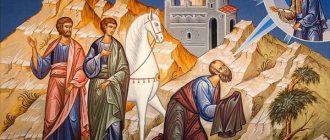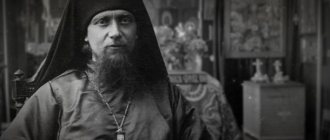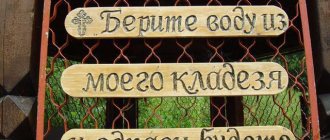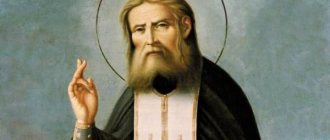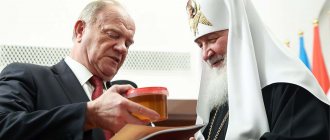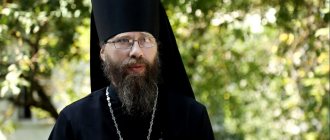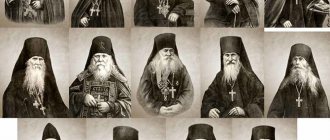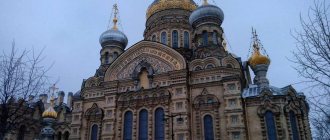***
The eldership in Optina Hermitage originates from Schema-Archimandrite Paisius Velichkovsky (1722-15/28 November 1794), a Moldavian elder, a native of the Poltava province, translator and compiler of the Slavic version of the famous spiritual code “Philokalia”. In 1829, his followers, led by Hieromonk Leonid (in schema Leo) (1768-11/24 October 1841), . Before this, he spent some time in different monasteries, and in one of them he met the disciple of the Moldavian elder Paisius, Father Theodore. Elder Theodore taught the Monk Leo, then still Father Leonid, the highest monastic work - “mental prayer.” The Monk Leo possessed many spiritual gifts. He also had the gift of healing. They brought many demoniacs to him. The victory over demons was won by the Monk Leo, of course, only after victory over his passions. No one saw him indignant with terrible anger and irritation, no one heard words of indignation and murmur from him. Calmness and Christian joy did not leave him. The Monk Leo kept saying the Jesus Prayer, and when asked by his disciple how he acquired such spiritual gifts, he answered: “Live more simply, God will not abandon you and will show His mercy.”
Prayer of the Optina Elders - what is it for?
Prayer calls have enormous power in helping to cope with numerous problems. With regular reading, you can find peace and restore peace of mind. The prayer of the holy Optina elders contains a request to God for guidance and support in business. Petitions cover numerous areas of life that a person faces. By reading them in the morning, you can psychologically tune in to a positive wave, and with regular repetition, you can notice how your resistance to stress has increased and your inner mood has improved.
The prayer of the Optina elders must be read with understanding of all the words. It is important to formulate the expressed desire correctly and there is no need to list all the problems, but simply ask for support and opportunities to achieve what you want. You need to start reading by tuning into the desired wavelength, for example, using meditation. For God to hear requests, it is important to have unshakable faith, which is a guide.
***
Elder Leo’s disciple and fellow-hierarch, Hieroschemamonk Macarius (1788-7/20 September 1860), arrived in Optina Pustyn after the Monk Leo and entered under his spiritual guidance. Previously, he met Elder Leo in the Ploshchanskaya Hermitage, where he stayed under the guidance of Elder Athanasius, the closest disciple of the Monk Paisius of Velichkovsky. Elder Athanasius possessed a large number of translations of patristic works made by the Monk Paisius, and he introduced the Monk Macarius to the research and literary activities. Later, already in Optina, the Monk Macarius heads a group of scientists and writers - monks and laymen who translate, process and translate into literary language the writings (mainly in the translations of Elder Paisius) of the greatest ascetics of antiquity: Isaac the Syrian, Macarius the Great, John Climacus. The Lord also granted St. Macarius the gift of spiritual reasoning. His humble word about the spiritual benefit of his neighbor was supported by true humility in his appearance, in his clothes, in his every movement. The saint's face was constantly bright, shining with spiritual joy and love for his neighbor, which showed the visible effect of the Jesus Prayer he constantly performed.
Used materials
- From the words of Patriarch Alexy II of Moscow and All Rus' on the day of glorification of the Council of the Elders of Optina, Holy Vvedensky Cathedral of Optina Hermitage, July 26, 1996:
- “Reverend Macarius of Optina,” page of the Orthodox encyclopedia ABC of faith
:
- Menea. October, ed. Moscow Patriarchate, p. 896 (troparion, kontakion):
- Service to the Optina Elders (Russia) // Blog of priest Maxim Plyakin (in troparion, in kontakion, Optina Pustyn):
Trinity Orthodox Russian Calendar for 2014 - Holy Trinity Monastery. Tѵpografїѧ Ave. Iva Pochaevsk in Jordanville, 2013 // Printed with the blessing of His Eminence HILARION, Metropolitan of Eastern America and New York. - P. 136; Calendar on the official website of the Cathedral of the Holy New Martyrs and Confessors of Russia and St. Nicholas in Munich (Russian Orthodox Church Outside of Russia), .
“Deacon Maxim Plyakin, Hagiological and canonical consequences of reunification with the ROCOR,” LiveJournal page of the user sobor_voronezh, .
***
The eldership that flourished in Optina owes its existence largely to Schema-Archimandrite Moses (1782-16/29 June 1862). The merit of the Monk Moses is that it was thanks to him, his collaboration with the elders Leo and Macarius, that not only the external improvement of Optina Pustyn, but also its very spiritual flowering became possible. When the Monk Moses, after he founded the Optina monastery, became the abbot of the entire monastery, Father Leonid (Elder Leo) arrived at the monastery, laying the foundation for the eldership in Optina. Thanks to the fact that the Monk Moses went through the same spiritual path of inner work as Elder Leo, a deep mutual understanding, unanimity in the full sense of the word, developed between both strict ascetics. Himself a strict faster and ascetic, the Monk Moses was filled with the most tender love for people and was lenient towards their sins. The entire life of the saint can be expressed in these words: he lived secretly in God amid incessant external worries and worries. Elder Moses managed to successfully hide himself from people, which is why many who did not know the Optina abbot closely considered him, although a good, but an ordinary person: only spiritual men felt the fragrance of the virtues of the Monk Moses and considered him a highly spiritual elder.
Are there any elders now?
Elder ministry could not be revived quickly after years of atheism
Therefore, the word “elder” is now used with great caution. Nevertheless, the Church now knows confessors whose talents are comparable to those of the ascetics of the past
Among them, according to many, is the confessor of the brethren of Optina Pustyn, Fr. Iliy (Nozdrin). O. Iliy is also the confessor of Patriarch Kirill.
Who are they, the Optina elders? Devotees of the distant past? Then why is it so effective to treat them as if they were alive? Perhaps because for saints there are no boundaries of either time or space. Their elder service is not over and continues. Or perhaps it is still being transmitted. From teacher to student.
***
Schema-abbot Anthony (1795-7/20 August 1865) in 1825, after the appointment of his brother in the flesh, the Venerable Moses, as rector of Optina Pustyn, he was appointed head of the Optina St. John the Baptist Skete. And before that, he, also with his brother, labored in a strict life in the Roslavl forests, until they finally came into contact with the followers of the spiritual tradition of the Moldavian elder Paisius - the Monk Leo and the Monk Macarius. During the reign of the Monk Anthony at the Forerunner Skete, fathers who were wise in monastic life and strong in spiritual deeds began to flock there from different directions. Soon, however, the monk was appointed abbot of another monastery, but then due to illness he returned to Optina forever. The secret monastic feat of the Monk Anthony was to bear the cross of a severe, long-term illness throughout his life. Many, seeing his always bright face and hearing his animated conversation, did not understand what kind of sufferer was in front of them. As a great lover of silence, the Monk Anthony desired a solitary life spent in prayer, reading and contemplation of God. But his spiritual gifts attracted many visitors to him who wanted to receive blessings and spiritual edification. There were good reasons to assert that the Monk Anthony had great boldness in prayer to God, and was granted spiritual visions and other grace-filled visits.
Saint Cyprian
After the Battle of Kulikovo, when the Lord granted victory to the Russian army, when all of Rus' united on the Kulikovo field, we again see the result of the actions and words of St. Sergius, who prayed during the battle. The prince receives Saint Cyprian, one of the wisest men of his time.
Today we know little about Saint Cyprian. And he was a very active and educated person. In his person, Holy Rus' received a saint who was very close in spirit to both Saint Alexy and St. Sergius of Radonezh. Saint Cyprian began the reform of worship in Rus'; he brought the Athonite tradition of smart work to Rus'. The Kiev Psalter, the miniatures of which still inspire and delight us, was compiled by the protodeacon of Metropolitan Cyprian. The saint worked a lot on translations of South Slavic manuscripts into the language familiar to Rus', bringing the services into a dignified form.
To read The Beheading of John the Baptist - September 11, 2020
***
Optina reached its peak under the elder Hieroschemamonk Ambrose (1812-10/23 October 1891), a disciple of St. Leo and St. Macarius. In 1835, Alexander Grenkov (the future Elder Ambrose) became dangerously ill and vowed to become a monk if he recovered. The Lord heeded his prayer. In 1836, Alexander graduated from the seminary. For four years he put off fulfilling his vow, engaged in teaching, until the famous recluse Elder Hilarion of Troyekurovsky told him: “Go to Optina! You are needed in Optina! On October 8, 1839, Alexander Grenkov arrived in Optina Pustyn. He became Elder Leo's cell attendant. Then he performed various monastic obediences in the monastery itself and in the monastery; in the summer of 1841 he was tonsured into the ryassophore, and in 1842 into the mantle. In 1843 he was ordained a hierodeacon. And on December 7, on the way to Kaluga, for his ordination as a hieromonk, Father Ambrose, already by that time a very sick man, caught a cold and fell seriously ill. Thus began an uninterrupted chain of his illnesses. But such a physically weak hieromonk Ambrose possessed a different strength - spiritual and grace-filled. At the age of 36, he was appointed assistant to the Optina elder Macarius in the matter of monastic spiritual guidance and the care of the laity. With him he shared the work of translating and publishing patristic texts. After the death of Elder Macarius (1860), Father Ambrose became the only confessor of the Optina brethren and pilgrims. To him, blessed by God with the great gift of consolation, our much-sorrowful people rush from all over Russia: these are nobles, learned intelligentsia, and ordinary people - representatives of all classes, united by faith in God, thirst for spiritual consolation and love for Elder Ambrose, in response to the compassion of his heart, tireless in love for God and people. The elder also had such an amazing gift as the ability to hide his insight and gracious help under the cover of a joke. Numerous cases of his spiritual insight, miracles and healings are known. Dostoevsky and Leontyev, Tolstoy, Pogodin, Yurkevich and Strakhov came to the elder. Not far from Optina, in Shamordino, through the efforts of the Monk Ambrose, a Kazan women's monastery was built, which blossomed so quickly that by the 90s. XIX century the number of monastics in it reached 500 people. The elder spent his last days in Shamordino and departed to the Lord.
Father Ambrose
His first student, Father Ambrose, had many similarities with him in his character. He was the same soft, loving soul, full of condescension towards human weaknesses. No wonder he deeply loved his Abba. The writer of these lines remembers how someone once spoke disapprovingly in front of him about the appearance of the deceased elder. Father Ambrose took his portrait in his hands and looked at it with love for a long time, saying: “No, he was very good.” And his face shone with inexpressible tenderness. If we say that he was lenient towards human weaknesses, we do not want to say that he condoned them. No, everything dirty and unclean repulsed him, and he was very strict with those who violated the rules of morality without remorse. “We did not come to the monastery to anger God, but to appease Him,” he said to the monks who violated the monastery rules and did not repent of violating them. But if in the sinner he saw sincere repentance, heartfelt sorrow for his sins, then he was transformed: he responded with affection and forgiveness to their repentant tears, and with this heartfelt sympathy he immediately lifted the burden of sin from the sinner. “Father takes off your sorrow like a fur coat,” one merchant, his spiritual son, said about him.
Cathedral of the Venerable Optina Elders
His distinctive quality was Christian love. “Not that partial pagan love that loves only the one who loves him and does good only to those who are for some reason useful or pleasant for her, but that love that in all people sees first of all the image and likeness of God - and loves him and cries for his distortions, if he notices them. And he does not meet human weaknesses and infirmities with a proud word of reproach, but carries them all within himself. That love that forced one saint to boldly cry out to God in his prayers: “Lord, if I have acquired grace before You, if I have reached the Kingdom of Heaven, then command my brothers to enter with me, and without them I will not go there.” He taught this same love to all his spiritual children: he especially tried to plant it in their souls. In his letters and holiday greetings, he constantly points to Christian love as the highest virtue that a person should strive to achieve. Above all other elders, he can be called a preacher of love. “Our Lord Jesus Christ spoke two initial commandments to his disciples: My peace I give to you, My peace I leave with you (John 14:24). And again: I give you a new commandment, that you love one another (John 14:34). It is not in vain that the wise words of ancient people are repeated: “Where there is peace and love, there is God.” And “where God is, there is every good thing.” “Hearing the repeatedly repeated words in the Easter stichera - and we will forgive those who hate us entirely through the resurrection - let us try not only to forgive, but together not to have hatred for anyone. There is no higher virtue than love, and no worse vice and passion than hatred.” “Sisters in the Lord, and mothers, and spiritual children! Let us force ourselves to have love and goodwill towards everyone, to everyone who loves and does not love us, favorable and unfavorable, favorable and unfriendly. It is not in vain that it is said in the word of God: God is loving, and he who abides in love abides in God, and God abides in him (1 John 4:16).”
Metropolitan Tryphon (Turkestan)
***
Hieroschemamonk Hilarion (1805-September 18/October 1, 1873), known as Rodion, felt within himself the desire to become a monk from childhood. In 1829, being 24 years old, Rodion moved with his family to the city of Saratov, where he spent nine years of his life. In Saratov, under the patronage of His Grace Jacob, Rodion Nikitich courageously fought against schismatics of various persuasions for the purity of Orthodoxy. Gradually, with spiritual maturity, comes the final determination to leave everything and follow Christ. After visiting many monasteries, Rodion calms down in Optina Hermitage. On March 13, 1839, he was already accepted into the monastery brethren. Rodion was chosen by the Monk Macarius to be his cell attendant and remained in this obedience for twenty years, until the day of the blessed death of Elder Macarius in 1860. Having taken upon himself the “saving cross of obedience”, growing in inner work, the Monk Hilarion forced himself in every possible way to carry out bodily labors. In addition to the obediences that the Monk Hilarion carried out as his elder’s cell attendant, he also, according to the needs of the monastery brethren and the household, was a gardener, a gardener, brewed kvass, baked bread, and cared for bees in the apiary. In the last days of his life, Elder Macarius blessed the Monk Hilarion to continue his senile activity, entrusting him to the spiritual guidance of many of his spiritual children, which emphasized the success of the Monk Hilarion in his inner work. Along with the grace-filled gift of spiritual reasoning, Elder Hilarion also had the gift of foresight; he was a teaching man, leading a truly ascetic life. However, not only reverence and love fell to his lot, but sometimes the monk had to endure blasphemy and slander. But he endured all this with great humility and condescension towards all human infirmities.
Venerable Sergius and his neighbors
The disciples of St. Sergius are a special conversation.
More than forty disciples who grew up at the feet of this prayer book, more than forty monasteries founded by them! Among them are such pearls and outposts of spiritual life as the Kirillo-Belozersky Monastery, Ferapontov Monastery, Savvino-Storozhevsky Monastery...
All this is the work of an ascetic who preferred solitary prayer.
In connection with the image of St. Sergius, I also want to draw attention to the vivid testimony he gave about the commandments of God. Despite his desire for monastic life, he carried the commandment to honor and care for his parents until the very end.
Today many come and complain: “Dad and Mom are interfering with my spiritual life! They won’t let me go either to the monastery or to holy places!” In response to this, I always cite the example of St. Sergius, who was near his parents, bearing this obedience, fulfilling the commandment of God. Only after accompanying his parents on the journey of the whole earth did he consider it possible to begin his own spiritual work, to the monastic feat.
Take heed, brothers!
The image of the saint should be bright and instructive for us. We must not just remember this saint, but apply his way of life and thoughts in our lives.
I would like to recall the words from the will of the saint, transmitted by his disciple, who compiled his first life.
St. Sergius considered the most important thing to be attentive to oneself: “Pay attention to yourself, brothers! First have the fear of God, spiritual purity and unfeigned love.”
These words became a testament for all of us.
Prepared by Maria Senchukova
***
Hieroschemamonk Joseph (1837-9/22 May 1911), while still an eight-year-old boy, was honored with the appearance of the Mother of God, which predetermined the path of the future ascetic. From that moment on, he changed a lot, became quiet and thoughtful, avoided children's games. In his youth, the monk went on a pilgrimage to Kyiv and on the way went to Optina Hermitage to visit the Monk Ambrose. The elder, after listening to the young man, said: “Why do you need to go to Kyiv, stay here.” The new novice was appointed one of the cell attendants of Elder Ambrose. He lived in his “shack” for more than half a century: thirty years with the monk and twenty without him. Elder Ambrose trusted Father Joseph in everything, calling him his right hand, and never parted with him for thirty years. In 1888, during a serious illness, when the Monk Joseph was tonsured into the schema in view of his seemingly imminent death, the Queen of Heaven visited Her chosen one again with the words: “Be patient, My beloved, there is not much left.” Soon the Monk Joseph was appointed head of the Optina monastery; While in this position, after the death of Elder Ambrose, he was the recognized confessor of the Optina brethren and laity. Many testimonies have been preserved about the gift of clairvoyance and healing through the prayers of Elder Joseph. In April 1911, the elder fell ill, his illness gradually intensified, and on May 9 he quietly departed to the Lord.
Saint versus intrigue
When Saint Alexy was already infirm, it was in the monk that he saw his successor. The saint categorically did not agree to this - it was unthinkable for his spiritual structure. After the death of the saint, we see an active struggle among clergy for the metropolitan throne of Kiev, Moscow and all Rus'.
There were intrigues here for Prince Dmitry Donskoy, whom we also honor as a saint - largely thanks to St. Sergius! The prince's protege, one of his friends, quickly became an archimandrite, and then a candidate for the metropolitan throne. Saint Dionysius of Suzdal actively joined the fight. All the candidates rushed to Constantinople, which also had a difficult situation at that time, and the candidates for the episcopal sees of Rus' did not have time to follow it - so hastily the emperors and patriarchs were replaced...
In this struggle, the monk remained himself - he and God. When Saint Cyprian - legitimate, canonical - went to the Moscow throne, Prince Dmitry Donskoy did not accept him - he humiliated, robbed, expelled him from the borders of his principality. What did the reverend do? He stopped communicating with the prince. And seeing the strength of his authority, the depth of his advice, the prince was forced to correct himself, humble himself, become different, cast aside his human ambitions and follow the elder’s instructions.
We know this plot from history: Prince Dmitry Donskoy receives the blessing of the monk before the Battle of Kulikovo. But this blessing is not just a prayerful appearance before the saint, but an act of repentance. The venerable prince did not accept or bless him, demanding from him humility of his pride, and in exchange for this, justification in the eyes of God. The blessing on the eve of the Battle of Kulikovo is the result of the prince’s repentance.
***
Reverend Anatoly "senior" (1824-1894) . After graduating from theological seminary, Alexey (the worldly name of St. Anatoly) became seriously ill with consumption and made a vow: if the Lord healed him, he would take monastic vows. The Lord gave him life, and soon, in July 1853, he came to Optina Pustyn. Elder Macarius began to guide the spiritual life of the young novice, and then handed him over to the leadership of the Monk Ambrose. From the very first years of his stay at the monastery, the life of the future elder Anatoly was devoted to work for the benefit of his neighbors. Later, Elder Ambrose, seeing that the student was ripe to instruct others in spiritual work, began to gradually introduce him to the work of old age, preparing his closest collaborator and assistant. And in 1874, for obedience to Elder Ambrose, the Monk Anatoly accepted the position of monastery commander. Elder Ambrose also entrusted him with the care of the newly created Shamordino women's monastery. The Monk Anatoly had an unusually merciful and compassionate character. If he learned about someone’s grief, he was so worried that he began to have a terrible headache, and then his heart began to ache... For twenty-one years he was a devoted, endlessly loving father and mentor to the nuns of Shamordin. The Monk Anatoly possessed all the fullness of the gifts of the Holy Spirit: the gift of insight and spiritual reasoning, healing of mental and physical ailments. With a few words, filled with love and spiritual experience, he knew how to console a grieving soul, carefully warn about upcoming trials, and prepare for imminent death. Soon after the death of Elder Ambrose, the Monk Anatoly began to fade away. He endured his dying illness meekly and humbly. On December 15, 1893, he secretly accepted the schema.
Optina and the intelligentsia
In the XIX - early XX centuries. Representatives of the educated class often went to the monastery. The Kireevsky brothers, the philosopher Konstantin Leontyev (later the monk Clement), N.V. Gogol, L.N. Tolstoy, F.M. Dostoevsky, P.I. Tchaikovsky, the Aksakov brothers, A.S. Khomyakov, historian S.M. Soloviev, Grand Duke Konstantin Romanov (known as a poet under the pseudonym “K.R.”) and many others.
The monastery then played a missionary role for the intelligentsia. Since the 18th century representatives of the intellectual elite, cut off from their native roots and having received a European education, were in a spiritual vacuum. Spiritual quests led to the spread of occult practices and a passion for Freemasonry. The example of living holiness shown by the Optina elders often turned the whole world of the Russian intellectual upside down.
This happened with N.V. Gogol, K.N. Leontiev, F.M. Dostoevsky. But there were also many for whom meeting the elder did not change anything. About L.N. Tolstoy, who came to St. Ambrose, the elder said with contrition: “What a proud man!”
***
Schema-Archimandrite Isaac (1810 - August 22/September 4, 1894) comes to Optina at a mature age (36 years old) and becomes a novice of the Optina elder Venerable Macarius, already well-known by that time. The Monk Isaac was distinguished by amazing modesty, a sincere and open attitude towards the brethren, while at the same time remaining strict and demanding of himself, relying in everything on the spiritual instructions of the elder. In 1860, the Venerable Elder Macarius, sensing the approaching end, bequeathed Father Isaac to come under the leadership of Elder Ambrose. And two years later, in 1862, after the death of the rector of the Optina Hermitage, Elder Moses, the Monk Isaac became his successor. For more than thirty years he has been leading the monastery, continuing the construction begun by the Monk Moses, which was considerable at that time. Already being an abbot, and later, in 1885, an archimandrite, the monk did not perform any monastic affairs without the elder’s blessing and taught this to the brethren. “Fathers and brothers! You need to go to the elder to clear your conscience,” he often repeated. So reverently, almost to the point of belittling himself, he stood with everyone in line to see his confessor, the Venerable Elder Ambrose, and talked with him, kneeling, like a simple novice. After the death of the Monk Ambrose, secret denunciations followed against the rector, the Monk Isaac, about his inability, due to his advanced years and illness, to manage the monastery. And although the brethren unanimously stood up in defense of their abbot, his strength was already fading. He died quietly, surrounded by his weeping children, to whom he gave the last instruction: “Love God and your neighbors, love the Church of God, in church services, in prayer, seek not earthly, but heavenly blessings...”.
Prayer of the Optina Elders for every day
There are several sacred petitions that have great energy, but there is the most famous and powerful prayer that can be said every day. It will give protection, thanks to which a person will feel confident and supported. The prayer of the last Optina elders is large and not everyone can learn it, so you can write it down on a piece of paper and repeat it if necessary.
***
The path to the monastery for Pavel Ivanovich Plikhankov, Schema-Archimandrite Barsanuphius (1845-1/14 April 1913) , was long and difficult: 46 years have passed in the world - most of his life. Cadet corps, military service, brilliant career. A direct opportunity to acquire all worldly goods. And... giving up everything. The thought of monasticism was frightening at first; entering a monastery seemed impossible. But gradually the determination to leave the world matured. All that remained was to make a choice: in which monastery to begin the monastic feat? During the period of these thoughts, Pavel Ivanovich came across a spiritual magazine, and in it there was an article about Optina Pustyn and the Venerable Elder Ambrose. Having visited the elder and heard the words: “Come in two years, I will receive you,” Pavel Ivanovich, having resigned, arrived in Optina, but no longer found the Monk Ambrose alive. On February 10, 1892, Pavel Ivanovich was enrolled in the brotherhood of St. John the Baptist Skete and dressed in a cassock. Every evening for three years he went to talk to the elders: first to the Monk Anatoly, and then to the Monk Joseph. In 1907, after returning from the Russian-Japanese War, where he served as a priest and confessor, the Monk Barsanuphius was elevated to the rank of abbot and appointed head of the monastery. As if to a haven of salvation, the people of the similarly blessed Optina monastery sought to the Monk Barsanuphius for the healing of not only their bodies, but also their tormented, sin-weary souls. He saw the human soul, and through prayers the most hidden things in a person were revealed to him, and this gave him the opportunity to raise up the fallen, direct them from the wrong path to the true one, heal mental and physical illnesses, and cast out demons. In 1912, the Monk Barsanuphius was appointed rector of the Staro-Golutvin Epiphany Monastery. Being actually in the position of an exile from his beloved Optina, Elder Barsanuphius courageously endured a severe dying illness and betrayed his pure soul to the Lord.
Prayer of the Optina elders for children
One of the most powerful is considered to be a mother’s petition, which can work miracles. Parents turn to Higher powers to enlighten their children and guide them on the right path, save them from illnesses and help them in other situations. The clergy say that parental duty is to pray daily for their child. The prayer of the Optina elders for children is aimed at saving the soul and protection, and it sounds like this:
***
Hieroschemamonk Anatoly “the Younger” (1855-July 30/August 12, 1922), having taken monastic vows in Optina in 1895, gradually entered into the work of senility and after the death of the elders St. Joseph and St. Barsanuphius, together with St. Nektarios, became the continuer of senile spiritual work. The elders do not reject anyone, but it so happened that the monastics and intelligentsia sought to the Monk Nektarios, and the common people came to the Monk Anatoly with their worries and complaints, sorrows and illnesses. “Always humble and never discouraged” - people affectionately called him “the comforter”, and also “the second Seraphim”. After the closure of Optina Pustyn, they came with a search to the Monk Anatoly and pulled out from his cell what little he had not yet managed to distribute to his children. Finally, they decided to arrest the sick old man. The arriving GPU commission asked the cell attendant of the elder Father Varnava: “Is the elder ready?” “Yes, I’m ready,” answered Father Barnabas. And he let them into the cell. There, on the table, in a coffin, lay the “prepared” deceased elder. The Lord accepted His servant, who turned out to be truly ready to appear before God.
Prayer of the Optina Elders at the end of the day
There is a special prayer appeal designed specifically for reading in the evening. If it is not possible to pronounce the words yourself, then you can listen to them recorded, because when listening to the prayers of the Optina elders, the soul is filled with warmth and special energy. People who regularly read sacred petitions at the end of the day note that their worldview and life in general have changed significantly. The evening prayer of the Optina Elders gives a person self-confidence to deal with daily difficulties.
If possible, before praying, it is recommended to visit the temple to ask the clergyman to absolve sins and receive a blessing. After returning home, it is not recommended to listen to music or watch TV, and it is better to spend the remaining time before bed in a quiet environment. The prayer of the Optina elders must be said in silence, so it is important to ensure that no one disturbs. You must speak the text three times in a row.
***
Hieroschemamonk Nektary (1853-April 29/May 12, 1928) was the last conciliarly elected Optina elder. Nicholas, as the saint was called in the world, came to Optina Pustyn in 1873, carrying only the Gospel in a knapsack on his back. Nicholas was received by the venerable elder Ambrose. What their conversation was about, the Monk Nektarios did not reveal to anyone, but after it he remained forever in the monastery. He became the spiritual son of the Monk Anatoly (Zertsalov), and went to the Monk Elder Ambrose for advice. The Monk Nektarios, who performed the sexton's obedience, had a cell with a door opening onto the church, in which he lived for twenty years, without speaking with any of the monks: he only went to the elder or confessor and back. He himself liked to repeat that for a monk there are only two exits from his cell - to the temple and to the grave. In 1912, the Optina brethren elected him an elder. But the Monk Nektarios refused, saying: “No, fathers and brothers! I am weak-minded and cannot bear such a burden.” And only out of obedience did he agree to take upon himself the eldership. After the monastery was closed in 1923, St. Nektarios was arrested. Upon leaving prison, the elder lived in the village of Kholmishchi. The humility of the reverend elder was extraordinary: while healing the sick, possessing the gift of clairvoyance, miracle-working and reasoning, he hid these high spiritual gifts under external foolishness. The Monk Nektarios died at a ripe old age in 1928 and was buried in the local cemetery. After the revival of Optina Hermitage, the relics of St. Nektarios were found and transferred to his native Optina.
Father Leonid
Father Leonid, judging by his biography and the stories of his contemporaries about him, appears to us, first of all, as a man of unshakable faith in his high calling, from which other properties of his character already flow: extraordinary courage, firmness and energy in defending his dear eldership. “Even if you send me to Siberia, even if you light a fire, even if you put me on fire, I will still be the same Leonid,” this is how he answered the rector when he pointed out to him the threat of the diocesan bishop to exile him for receiving visitors under his command. He also boldly responded to the bishop himself when he visited Optina Pustyn. Vladyka walked to church through the monastery courtyard full of people; Father Leonid suddenly left his cell to go to the same church. Instantly the crowd fled from the bishop and rushed to the elder, surrounded him, crowding him and demanding a blessing. Father Leonid, for his part, tried to push his way to the bishop in order to bow to him. When he approached, the bishop said to him reproachfully: “Are you still messing around with the people?” “I sing to my God, until I am!” - Father Leonid answered firmly and calmly.
Optina Elder Leonid
The fear of human judgment did not exist for him: he was filled only with the fear of God's judgment. That is why his words were distinguished by remarkable courage, simplicity and sometimes even harshness. He did not care about sophistication or beauty of expression, about softening his words, he told everyone the truth without hesitation, he said “you” to everyone, and then, when he saw his neighbor, he tried to snatch his pride from him. Often in his way of actions and expressions he resorted to semi-foolishness, wanting to cover up his spiritual wisdom and insight. Sometimes, at first, some were offended by his harshness, but, having gotten to know his loving soul better, they later became his most devoted disciples. Such a character could only be formed thanks to the sorrows and hardships that hardened him. That is why in almost all the letters written by him (they were also signed by Father Macarius), the main idea is that sorrow is necessary for the purification of the human soul. “You describe,” he writes, “the sorrows that happened. There is nothing to write to you about the necessity of sorrows for us, for you yourself know this truth, how our Lord Jesus Christ Himself suffered, leaving us an image, so that we too would follow His footsteps (1 Pet. 2:21), and to His disciples, as a certain inheritance, left sorrows: you will be in a world of sorrows (John 16:33). In finding sorrows, one must observe so that every sorrowful case can be attributed to those sent from the Providence of God; consider those who insult us as instruments of God, with which God acts in the matter of our salvation, and consider them to be our benefactors. When you turn the blame onto those who offend and grumble at them, then sorrows will multiply and become aggravated to the point of cowardice, which is the mother of torment, but on the contrary, patience is the mother of consolation.”
Metropolitan Tryphon (Turkestan) From a painting by Pavel Korin
Due to his character, tempered by temptations, he accepted everything with indifference. “The universal and all-evil enemy the devil,” he wrote to one of his spiritual sons, “although he creates many deceptions for us, nothing will succeed if we trust in God, remembering this teaching: blessed are you when they reproach you, and persecute you, and say everyone is angry with you who lie, for my sake: rejoice and be glad, for your reward is many in heaven (Matthew 5:11, 12), and although there is something confused in us, the Lord Almighty preserves my insignificance, and henceforth I hope and I entrust myself to His Providence.”
“You care about my thinness, that I seem to be insulted,” he wrote to another person, “this concern proves your feelings of love for me, and I thank you sensitively for them. But as for me, thanks to the Almighty and all-good Providence for me! I don’t see any sorrows that would be unbearable. If any things happen, then I receive God’s help to bear them. It is impossible to completely get rid of them... Whatever sorrows the Lord wishes to send us, we should all accept with thanksgiving.”
Such was the courageous fighter for eldership, Father Leonid.
Vvedenskaya Mother of God Monastery Optina Pustyn: history, where it is located
The time of the founding of Optina Pustyn is not known exactly; modern scientists talk about the 13th, 14th, or even 16th centuries. Versions of the name also differ. According to one of them, it comes from the name of one of the first inhabitants, a former robber of Opta, who performed a feat of repentance here.
Optina Pustyn
A more widespread and thorough version is that “optina” in Rus' was the name for monasteries of mixed composition, where both monks and nuns lived. Such monasteries often spontaneously arose where ascetics settled. The Optin monastery could also have appeared as a result of ruin, when the inhabitants of the monastery moved to another. This could create a mixed community. This often happened in Rus', for example, during the Mongol yoke.
Interesting fact
The ban on “optina” monasteries began to apply only from the end of the 15th century.
Information about the history of the monastery in the 16th-17th centuries. minimal, since the 18th century. it was completely deserted. Heyday and fame began in the 19th century. with the emergence of elder ministry here.
Now Optina Pustyn is a stauropegial monastery 4 km from the city of Kozelsk.
The heart of the monastery is the Cathedral of the Entry of the Blessed Virgin Mary into the Temple, restored after the destruction of the Soviet years. There are now 8 temples in total, 4 of which are always open to pilgrims. In addition to Vvedensky - Kazansky, Vladimirsky and Preobrazhensky.
Other churches are located on the territory of the monastery, pilgrimage hotels, and in the monastery cemetery. Some of them are closed to the laity; in others, services are not held every day. The chapel on the graves of Hieromonk Vasily and the monks Ferapont and Trofim, who were killed on Easter 1993, enjoys special veneration.
18
April 1993
On Easter night, three inhabitants of the Optina Hermitage were killed: hieromonk Vasily (Roslyakov) and monks Ferapont (Pushkarev) and Trofim (Tatarnikov).
There is also the monastery of St. John the Baptist, where since the 19th century. the beginning of old age has been laid. Now it is closed to pilgrims, but lay people can visit the cell of St. Ambrose. Four times a year, the so-called “open” liturgy is also celebrated, with the participation of pilgrims. This happens on the days of St. John the Baptist and on Bright Monday. The number of brethren in the monastery is about 10 people.
Address of the monastery: Kaluga region, Optina Pustyn village, near the town of Kozelsk.
Hieroschemamonk Lev (Nagolkin) (1768—1841)
Hieroschemamonk Leo (Nagolkin)
The first founder and inspirer of the Optina eldership. The entire life of this elder, spent in selfless service to God and his neighbors, was an expression of evangelical love. Through his exploits, unceasing prayer and God-imitating humility, he acquired the abundant gifts of the Holy Spirit.
The eldership of the Monk Leo lasted twelve years and brought great spiritual benefit. The miracles performed by the monk were countless: crowds of the destitute flocked to him, surrounded him, and the monk helped them all as best he could. Hieromonk Leonid (future governor of the Trinity-Sergius Lavra) wrote that ordinary people told him about the elder: “Yes, for us, poor, foolish, he is more than our own father. Without him, we are literally orphans.”
To read The Church honors the memory of the holy martyrs of the 14,000 murdered Bethlehem babies
The Monk Leo often told people about the benefits of compliance: “Where there is humility, there is salvation nearby.”
